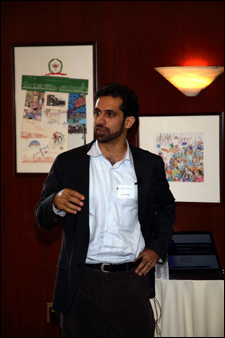At recent conference, ‘pie in the sky’ was on everybody’s plate
It was a time to free one’s mind, think outside the box, and consider some big ideas. At the invitation of the Center for International Development (CID), nearly 100 representatives of academia, government, and industry met at the Kennedy School on Sept. 9 for the “Blue Sky Conference” – an opportunity to discuss unorthodox notions that might ordinarily be dismissed as “pie in the sky.”
“We cast our net wide, with no specific agenda,” explained CID Director Ricardo Hausmann. “We just asked people for their best ideas.”
Presenting work done in concert with Michael Kremer, the Gates Professor of Developing Societies at the Faculty of Arts and Sciences, and Jonathan Shafter of Boston Provident, Stanford economist Seema Jayachandran offered an alternative for dealing with the “odious” debts racked up by brutal dictators and passed on to an oppressed populace. Trade sanctions, the standard recourse for dealing with “rogue nations,” hurt the public, while providing substantial rewards to cheaters, Jayachandran asserted. As an alternative, she and her colleagues advocate loan sanctions that can confer long-term benefits to citizens and are “self-enforcing,” she explained, “since there’s no incentive to loan to someone if you think you won’t be repaid.”
Hausmann, with Rafiq Hariri Professor of International Political Economy Dani Rodrik, addressed industrial policy, an area where well-meaning government agencies often fail because, unlike private firms, they aren’t guided by market signals or self-interest. To cultivate new industries, they recommend a “network” of agencies, rather than one central authority, and an open architecture-based system that exploits the marketplace’s self-organizing nature. “If you create a window,” Hausmann said, “people will come knocking and tell you what they need.”
Kennedy School Assistant Professor Asim Ijaz Khwaja described a Web-based networking project he developed for communicating during catastrophes. When a devastating earthquake struck Pakistan in October 2005, a few months after Hurricane Katrina ravaged the Gulf Coast, Khwaja thought about ways of coordinating relief efforts without relying on a single government agency like FEMA. With the help of U.S. and Pakistani colleagues, he devised RISEPak, a Web-based system for collecting and dispatching information in the earthquake’s aftermath. Given that census information, road maps, and satellite imagery are already available online, Khwaja said that within hours of a disaster anywhere in the world, an accessible, updatable “Web portal” like RISEPak could help assess the extent of damage, the number of people affected, and the kind of relief needed.

The World Trade Organization’s so-called “Doha round” negotiations have stalled, according to Robert Lawrence, the Albert L. Williams Professor of International Trade and Investment at the Kennedy School, who offered a seemingly painless way through the impasse. At issue, in part, are plans to reduce trade barriers around the world, which would hurt some of the poorest countries by eliminating preferential tariff arrangements they currently enjoy. Rich countries would delay tariff reductions for particular products, using the additional revenues so generated to compensate poor countries.
According to Kremer and CID researcher Stanley Watt, the conventional wisdom holds that an influx of unskilled workers to our shores hurts low-income Americans. Yet, in the case of foreign women employed in this country as nannies and maids, the researchers say the opposite is true. By freeing up skilled American women to enter the labor force, they suggest, a reliance on foreign home workers could boost the U.S. GDP by at least 1.2 percent, while reducing the wage gap between low- and high-skilled workers. Moreover, benefits would accrue to the countries from which these domestic workers came in the form of money sent to families back home. All told, these “remittances” could send $40 billion to less prosperous nations – four times more than the United States currently spends on foreign aid.
If the hope for the daylong exercise was to take a fresh look at familiar development issues and come up with potentially useful strategies, the first Blue Sky Conference would almost certainly be rated a success. Indeed, Hausmann plans to make the event an annual tradition. “This is not the end or the beginning of the end,” he said in his closing remarks. “It’s just the end of the beginning.”




